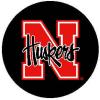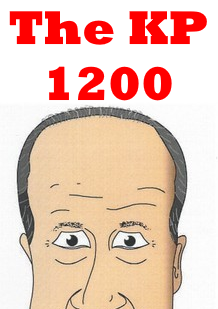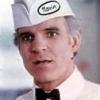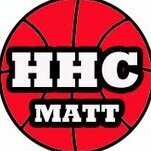Then & Now: Tony Farmer
Compiled By Dave Brandon
(Photo Courtesy NU Media Relations)
 Tony
Tony
Farmer played at Nebraska for one season, and that was
the record-breaking year of 1990-1991, which saw
Nebraska finish with a record of 26-8 and in the season
ending Top 10 of some polls.
Following his season at Nebraska,
Farmer went on to play in the NBA with the Miami Heat,
Charlotte Hornets, and Golden State Warriors.
The 6’9” 225-pound Farmer is our
latest guest in this Sunday’s edition of “Then & Now.”
HHC: You went to
Artesia High School in the L.A. area, and averaged 22.6
PPG and 10.0 RPG in your senior season (1987). You were
MVP of the Suburban Conference, and had your jersey
retired, along with Tom Tolbert and Ed O’Bannon. What
made you originally choose San Jose State out of high
school?
TF: It was close to
home, and I was very young coming out of high school and
didn’t want to go to far away. It was close enough and a
decent enough school where my parents could see me play,
so that was why the decision was made.
HHC: Did Nebraska ever recruit you out of
high school?
TF: No. My final five
choices were San Jose State, USC, UCLA, Oklahoma, and
Arizona.
HHC: You played a year and a half at San
Jose State, and actually played against Nebraska in the
Ameritas Classic of 1988-1989, averaging 17.0 PPG and
10.0 RPG in the two games. Was your experience in
Lincoln that weekend what made you choose to transfer to
Nebraska after leaving San Jose State at the midway
point of your sophomore season?
TF: Yeah. They had really good support and
I’d always known they had a good football team. But I
had good playing success there during that tournament
and really liked the atmosphere and people.
I also liked the Big 8 Conference,
because Oklahoma was one of my final choices since my
Dad went there. And I felt it (Nebraska) was a good
school with a good graduation rate. It was just a
situation that I felt I wanted to be a part of.
HHC: What was the perception of Lincoln
and Nebraska basketball to an L.A. kid at that time?
TF: To me, I knew it was a very, very
small city of 250,000. And, I wanted a slower pace
coming from L.A., so that played a big part in it being
my choice.
But also, one of the main things
was that I had a great relationship with the Mills
family there (Lincoln), Stan and Reta. They drove our
van for San Jose State during the Ameritas Classic, and
I maintained contact with them afterward because we had
a good time. And when I told them I was coming they were
all excited, and they helped make my transition easy.
HHC: Talk about your
relationship with Danny Nee, both at the beginning of
your career at Nebraska, and at the end?
TF: When I initially decided to transfer,
I spoke to Coach (Gary) Bargen first, and he told me
that they were definitely interested in me coming. And I
remember Coach Nee flew out and met me and my Dad and
told me it’d be a good opportunity.
From the first day I got to
Lincoln, he always made me feel welcome, and told me
that although I’ll be red shirting that first year, I
wouldn’t be less important than anyone else.
I had a good relationship with him
then, and even when I decided to turn pro, he kind of
put my name out there for me to see where I’d be taken
or go, and just supported me all the way through.
I remember that after my first year
I maintained contact with him, and periodically
throughout my pro career as well, although I haven’t
talked to him in some time. I talked to Coach Bargen
recently though, and we still stay in touch.
HHC: 1989-1990 was
your first season at Nebraska, and you sat out as a
transfer while the team went 10-18. What did you learn
that season, and was it beneficial for you?
TF: Yeah, it was good
for me because I felt it was a good transition. But the
main thing that kept us together was staying in Lincoln
after that season and going to summer school and working
out together. We became really close that summer, and to
this day, that’s the closest-knit group I’ve ever been
around.
You’ve got guys like Beau (Reid)
and Rich (King) that were already there, and me and
Keith Moody and (Eric) Piatkowski and (Bruce) Chubick,
we all came in the same year, and Jose (Ramos) came, and
we had a tough, tough run in practice, but it was the
closest group of guys I’ve ever been around.
HHC: Did you honestly have any idea that
you guys would have the kind of success you did in
1990-1991 prior to the start of the season?
TF: I felt we were good, and I think my
red shirt year that the team I was on that practiced
against the starters was just as good as some other
teams.
Now, did I know we’d be 26-8? No, I
can’t make that up, but I thought once we started
conditioning and stuff that guys came in shape, and
right when we began in the San Juan Shootout and we beat
Illinois, I knew we’d be special. How special? I had no
idea. But when I made that pass to Beau against Michigan
State to help us start 16-1, I knew it was going to be
real special.
HHC: 1990-1991 - What sticks out most?
TF: The thing that
sticks out is that every time we had a crossing, we
crossed it. People kept saying it was a fluke and we
weren’t that good, but we kept beating the same
consistent teams. We went to the Big 8 and Keith Moody
hit that three against Oklahoma, and Piatkowski came off
the bench with that effort.
Even though things didn’t end up
great in the Big 8 and NCAA Tournaments, no matter what,
they can’t change the history of our time and the makeup
of how we got there.
HHC: What was your favorite individual
moment of that season?
TF: The times when I had a chance to beat
Oklahoma, because I know Billy Tubbs was real cocky back
then, and like I said, the family had gone to OU. And I
had two good games against them, one at their place and
one in the Big 8 tournament, and that was probably the
biggest highlight for me individually.
And even before those games, they
acted like we wouldn’t be around, and that was just a
great achievement both for the team and myself to take
it to them.
HHC: Do you think that the late night
start against Xavier in the NCAA Tournament is a valid
excuse for the loss, like some have said, or is that
just that – an excuse?
TF: I think that’s
just an excuse. I really can’t say that the start time
matters. We were seeded way higher but they made the
shots, and I don’t think we took them as seriously as we
should have and it kind of showed in the end. We were
real upset by that.
HHC: How tough was it to have that season
end on a sour note like that?
TF: It just felt like there was a lot of
unfinished business, and the fact that I didn’t come
back for my senior season didn’t give me a chance for
redemption. If we would have kept me and Jose around, I
don’t know if we would have been as good, but close, but
life goes on.
HHC: What are your favorite memories of
Lincoln, both on and off the court?
TF: Probably on the court was the fan
support that year. We weren’t getting that much support
early, but as we got going, the fans were pretty good.
Off the court was being around the
teammates and being able to associate with lots of
people. My roommate at the time was Nate Turner, a
football player, and that was real good to have someone
from an opposite sport around, and we always supported
each other. And we stayed in touch until a few years
ago, and have now unfortunately lost touch.
HHC: When was the
last time you were in Lincoln, and have you been back to
a Nebraska game since you played?
TF: I haven’t been back to Lincoln since
the day I left to turn pro. So 15, 16 years. And I
haven’t watched a Nebraska game in quite some time,
although I watched some of the games that Pike played in
after I left, but I haven’t followed them as closely. I
see what they are doing here and there, but I haven’t
followed them like a diehard.
HHC: What made you choose to go pro
following the 1991 season?
TF: The fact is that I didn’t really know
what my eligibility was from the extra benefits, and I
knew that my family needed the money and it was the best
thing for me. So I took that risk, just because of my
family and eligibility. I didn’t want to lose my senior
season to eligibility and then be lost in the shuffle.
HHC: Before we talk about your NBA career,
can you give us a classic and colorful Danny Nee story
or two to add to our collection?
TF: (Laughs) There were so many that had
me laughing, but I remember one time he was getting on
Rich King about something when he said, “If you make
that shot again, I’ll kiss your ass clear up to Macy’s
store” and that was funny. And we were preparing for the
game one time, and we always showed highlight tapes, and
one of the highlights was Chris Cresswell dunking on me
in practice. And, I never understood what that had to do
with anything or why that was in there; he just seemed
to randomly throw that in there (Laughs).
There were lots of them, though. We
used to call Pike the “Black Hole” because he never
wanted to pass the ball when he was a freshman, and it
was like a gift when you got it.
HHC: (Laughs) Nice. Talk about some of
your pro stops before ultimately ending up with the
Charlotte Hornets in 1997.
TF: When I first came out of Nebraska, I
went to the CBA from 1991-1994, and then I went to
France after that. And while I was in France, we went to
the finals my first year and we did well. And then after
that I had a chance to sign with the Miami Heat in
1995-1996.
But to back track, when I came out
of Nebraska, I was given a guaranteed contract by the
Lakers even though I wasn’t drafted. Magic (Johnson)
tested positive for HIV, and I had to go to the CBA
since I was already getting the money guaranteed. Mike
Dunleavy was the Head Coach and Randy Pfund was a top
assistant. And after I was in Europe, Randy had been in
contact with my agent, Mitch, and they wanted to keep an
eye on me.
So after I came back from France,
Pfund had contacted Mitch and said they (the Lakers)
wanted to work me out for three days. So, I flew down
and worked out for three days, and they worked out 121
players, and Pat Riley (Miami Heat) came to Mitch and
said they wanted to sign me, and I signed a guaranteed
contract with them that year (1996) but then they waived
me in January and I went back to Europe before
ultimately signing with the Charlotte Hornets in 1997.
And when I was with Charlotte,
Bobby Phills went down with an ankle injury and I
started a game against the Knicks, and after that, I
left for the lockout and Golden State but they
ultimately had to waive me. (Editors Note: To put it shortly,
Farmer played in the CBA in 1991-1992, 1992-1993,
1993-1994, and 1996-1997. He played in France in
1992-1993, 1994-1995, and 1995-1996. He played in
Charlotte in 1997-1998 and Golden State in 1999-2000)
HHC: Talk about that
season with Charlotte in 1997-1998, and tell us about
some of your teammates and favorite memories there?
TF: My favorite memories were my first
start on Halloween night against the Knicks, and I
looked at the lineup, and it was Glen Rice, Anthony
Mason, Vlade Divac, David Wesley and I. And I had been
really been close to Glen and he was really instrumental
in me getting to Charlotte, so that was nice.
And then playing against the Heat
was soon after that first start, and I had 11 points and
5 rebounds which was great because I had a chance to
show Pat Riley and them that I thought they had a
mistake in releasing me.
HHC: You finished your NBA career in
1999-2000 with the Golden State Warriors, and actually
had the most success there, as you appeared in 74 games.
How fun was that season?
TF: That was one of the most fun pro years
in the NBA because I made a big contribution. Actually,
that was probably the funnest for me because I had a
chance to have a break out season and I ended up signing
back with Charlotte for 3 years after that season, but
the GM didn’t like the fact that Coach Paul Silas had
signed me again since I went to play in Europe after
asking the Hornets for my release the previous year.
So, the GM wouldn’t approve my
contract and I went to Greece and Russia, and I retired
after Russia because I was going through a divorce and I
had two young kids.
And ever since then, I’ve been
doing ABA stuff and helped start the Salt Lake City team
out here and am part owner and player, but now I’m
getting ready to move back out to California.
But, I still get calls all the time
to play, because I’m 36 and still in great shape. But
that’s not going to happen because I’m moving to San
Diego in about three weeks.
HHC: Talk about some of your favorite
teammates and memories of the NBA?
TF: One of my favorite memories was having
a chance to work out with Karl Malone all summer during
the lockout and the next summer, too. Ike Austin still
lives here (Salt Lake City) and we are good friends.
Glen was one of my favorites, too, because I have never
seen a guy work that hard and stay that good for that
long of a time.
I also remember playing against the
Lakers and having 10 and 15 while having to guard Shaq.
I also had a great game against Portland once where I
had 18 points and 7 rebounds when they had (Scottie)
Pippen, (Detlef) Scrempf, and (Jermaine) O’Neill.
HHC: Finally, what is Tony Farmer up to
today?
TF: Right now I’m a
mortgage broker, which I do in 45 states. I’ve been
self-employed the past year and I’m relocating to San
Diego because there are some opportunities and I want to
be close to my family.
I was married for 5 years but have
been divorced for the last 3. I have two children;
Londyn is my son and is 5, and TaSia is my daughter and
is 4 and now starting school. And her mom lives here in
Utah, so I’ll fly back every other weekend and see the
kids.
But I’m opening up my business out
there, and that’s where I’ll end up retiring.
HHC: And are you cool
with taking some e-mails at
[email protected] if we tell you how to
check it?
TF: Definitely.
HHC: Awesome. Anything you’d like to add?
TF: Well, unfortunately I couldn’t make
the 1990-1991 team reunion last February because I had a
big press conference here, and being one of the owners
and marquee players with the team, I couldn’t get away.
But I want to say that I appreciate
the hospitality and everything while we were there, and
you guys helping to put together the reunion was great,
and hopefully we can have a big reunion and an alumni
game sometime and all play. Heck, maybe we can even play
against the team from right now, and we might even beat
them with me, Beau, and Pike, and some of those guys
that still play.
I still think I can play, because I
played in the ABA this year with Dennis Rodman and some
of those guys, and I had a triple double by my third
game. Then you’ve got Pike… Man, we might drop 60
together on them (Laughs).
HHC: (Laughs) That’s hilarious. I think
Beau would play in that game in a hurry, too (Laughs).
Thanks a lot for your time Tony.
TF: I appreciate it
Dave, thanks for running this site and take care.<script type="text/javascript" language="javascript">





Recommended Comments
There are no comments to display.
Join the conversation
You can post now and register later. If you have an account, sign in now to post with your account.